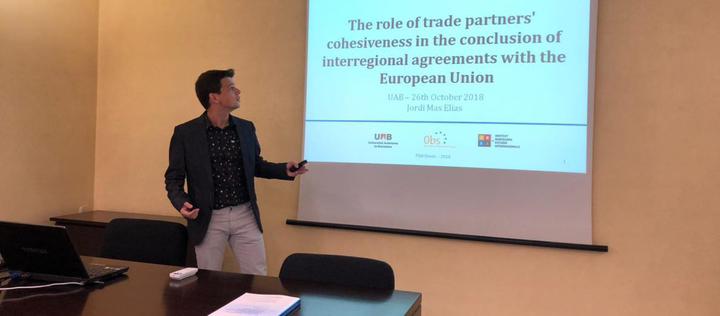The role of trade partners' cohesiveness in the conclusion of interregional agreements with the European Union
 Image credit: Normcon
Image credit: NormconAbstract
The European Union (EU) has become in recent years one of the most active global players in liberalizing barriers to trade. Since the creation of the World Trade Organization and besides its participation in multilateral negotiations, the Union has launched several negotiations with different countries and regions with the aim of establishing preferential trade relationships with them. In the case of region-to-region negotiations, some of them have successfully concluded with agreement whereas others have not. Interactions among world regions have constituted the natural object of study of interregionalist literature. Dominated primarily by qualitative research, the field has so far enhanced its theoretical development mostly with single in-depth case-based studies of regional interactions. One of the exceptions due to its encompassing approach to analyze the EU region-to-region trade outcomes is the theoretical framework developed by Aggarwal and Fogarty. In their edited volume, the authors identify the factors to take into account to determine the existence of cohesiveness in the EU’s regional counterpart and apply them qualitatively to several cases. This thesis brings quantitative analysis to the study of interregionalism and, taking Aggarwal and Fogarty’s framework as the departure point, suggests a method to measure and analyze the impact of the EU’s partner cohesiveness on interregional trade negotiations outcomes. Cohesiveness is understood as a mechanism formed by different factors that helps the regional partner to diminish the number of veto players and allows the grouping to work together effectively as a unit. The research operationalizes quantitatively the factors and dimensions that compound the cohesiveness of the counterpart identified by Aggarwal and Fogarty and measures the average effect of the independent variable on the conclusion of interregional negotiations with the EU. The study hypothesizes, therefore, that cohesiveness has a positive effect on the likelihood that negotiations conclude with agreement with the EU. This thesis supports Aggarwal and Fogarty’s claim that cohesiveness of the EU’s regional counterpart is an independent variable of EU trade conclusion. Therefore, it cannot be discarded as a factor that determines the probability of agreement. Results show that the most important factors helping cohesiveness to explain the likelihood of concluding an agreement with the EU are the power considerations within the counterpart region and the degree of authority pooled by the member states to regional institutions. As regards to power considerations, negotiations are more likely to conclude where the EU negotiates with a counterpart formed by large hegemons and small open economies. In the case of institutional authority, probabilities of conclusion are higher in regions whose members have engaged in a deep transfer of competences to the regional level. The research makes three further contributions. First, the analysis through quantitative tools suggests some modifications to the dimensions proposed by Aggarwal and Fogarty. By assessing the correlations of the dimensions identified by the authors, the research tests their empirical meaning and proposes accordingly new groups of factors that conform cohesiveness. Second, the quantitative operationalization of the variables brings new empirical data to the study or interregionalism. And third, the findings suggest some insights for the EU trade policymaker, such as taking into consideration the distribution of power in the counterpart when selecting and negotiating with regional partners.
I obtained my PhD on October 2018 with the thesis titled The role of trade partners’ cohesiveness in the conclusion of interregional agreements with the European Union. The thesis explored the most important factors helping cohesiveness to explain the likelihood of concluding an agreement with the EU.
The thesis was developed under the framework of the Politics, Policies and International Relations PhD programme of the Autonomous University of Barcelona (UAB) and was directed by Esther Barbé (UAB-IBEI) and Patricia Garcia-Duran (UB), principal investigator of the EU-NormCon project and the Observatory of European Foreign Policy group. The jury was formed by José Antonio Sanahuja (Universidad Complutense de Madrid), Oriol Costa (UAB), and María García (University of Bath).